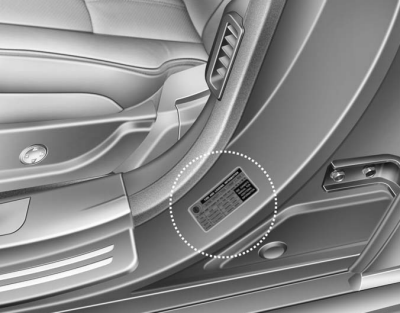 Hyundai Equus: Recommended cold tire inflation pressures
Second generation VI (2009–2025) / Hyundai Equus 2009-2025 Owners Manual / Maintenance / Tire and wheels / Recommended cold tire inflation pressures
Hyundai Equus: Recommended cold tire inflation pressures
Second generation VI (2009–2025) / Hyundai Equus 2009-2025 Owners Manual / Maintenance / Tire and wheels / Recommended cold tire inflation pressures
All tire pressures (including the spare) should be checked when the tires are cold. “Cold Tires” means the vehicle has not been driven for at least three hours or driven less than one mile (1.6 km).
Recommended pressures must be maintained for the best ride, vehicle handling, and minimum tire wear.
For recommended inflation pressure, refer to “Tire and wheels” in section 8.

All specifications (sizes and pressures) can be found on a label attached to the driver’s side center pillar.
WARNING - Tire underinflation
Severe underinflation can lead to severe heat build-up, causing blowouts, tread separation and other tire failures that can result in the loss of vehicle control leading to severe injury or death. This risk is much higher on hot days and when driving for long periods at high speeds.
CAUTION
- Underinflation also results in excessive wear, poor handling and reduced fuel economy. Wheel deformation also is possible. Keep your tire pressures at the proper levels. If a tire frequently needs refilling, have it checked by an authorized EQUUS dealer.
- Overinflation produces a harsh ride, excessive wear at the center of the tire tread, and a greater possibility of damage from road hazards.
CAUTION
- Warm tires normally exceed recommended cold tire pressures by 4 to 6 psi (28 to 41 kPa). Do not release air from warm tires to adjust the pressure or the tires will be underinflated.
- Be sure to reinstall the tire inflation valve caps. Without the valve cap, dirt or moisture could get into the valve core and cause air leakage. If a valve cap is missing, install a new one as soon as possible.
WARNING - Tire Inflation
Overinflation or underinflation can reduce tire life, adversely affect vehicle handling, and lead to sudden tire failure. This could result in loss of vehicle control and potential injury.
CAUTION - Tire pressure
Always observe the following:
- Check tire pressure when the tires are cold. (After vehicle has been parked for at least three hours or hasn't been driven more than one mile (1.6 km) since startup.)
- Check the pressure of your spare tire each time you check the pressure of other tires.
- Never overload your vehicle. Be careful not to overload a vehicle luggage rack if your vehicle is equipped with one.
- Worn, old tires can cause accidents. If your tread is badly worn, or if your tires have been damaged, replace them.
 Tire care
Tire care
For proper maintenance, safety, and maximum fuel economy, you must always maintain
recommended tire inflation pressures and stay within the load limits and weight
distribution recommended for your ...
 Checking tire inflation pressure
Checking tire inflation pressure
Check your tires once a month or more.
Also, check the tire pressure of the spare tire.
How to check
Use a good quality gage to check tire pressure.You can not tell if your tires
are properly inf ...
See also:
Operation of the parking assist system
Operating condition
This system activates when the parking assist button is pressed with the
Engine Start/Stop Button ON.
The parking assist button turns on automatically and activates the ...
Body Control Module (BCM) Repair procedures
Removal
1.
Disconnect the negative (-) battery terminal.
2.
Remove the crash pad lower panel after loosening the mounting screws.
(Refer to Body - "Crash Pad Lower Panel")
3.
Disconnect t ...
Steering Column Shroud Panel Repair procedures
Replacement
[Steering column shroud lower panel]
•
Put on gloves to protect your hands.
•
When prying with a flat-tip screwdriver, wrap ...
